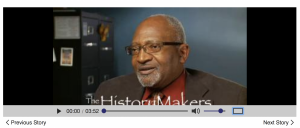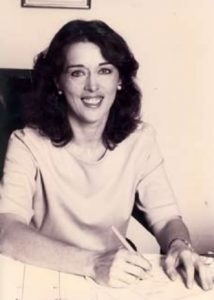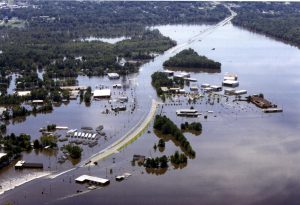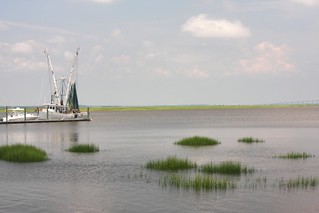Oral history interviews offer another means to contextualize our past and present. Interview recordings capture voices and perspectives overlooked in other media. Here are some environmentally-focused collections available through Emory, or publicly accessible:

Dr. Robert Bullard (Credit: HistoryMakers Digital Archive)
The HistoryMakers Digital Archives contains hundreds of video interviews with notable African Americans, including sociologist and “Father of Environmental Justice,” Dr. Robert Bullard, and opera singer and preservationist of American Beach in Florida, MaVynee “Beach Lady” Betsch.

Lois Gibbs (Credit: EPA)
The Environmental Protection Agency’s Superfund 25th Anniversary Oral History Project includes transcripts of interviews with forty people, including environmental activists Lois Gibbs (above), Louise Calvin, and Ellen Colangelo, regarding the creation and operation of Superfund, a federal program enacted in 1980 to decontaminate sites exposed to hazardous substances. (publicly accessible)

Edgecombe County, North Carolina after Hurricane Floyd (Credit: FEMA/David Saville)
Voices after the Deluge: Oral History Investigations of the Great North Carolina Flood, a project by the Southern Oral History Program at the University of North Carolina at Chapel Hill, provides access to first-hand accounts of the immediate devastation and long-term effects of 1999’s Hurricane Floyd on eastern North Carolina and some of its most vulnerable residents like children, lower-income households, and the elderly. (publicly accessible)
The University of Georgia’s Environmental Oral History Project includes the audio files for twenty-two interviews recorded between 2013 and 2015. Many of the recordings focus on the development on Jekyll Island and other Georgia Sea Islands, water quality on Georgia’s major rivers, and managing coastal fisheries. (publicly accessible)
The Eastwick Friends & Neighbors Coalition (EFNC), the John Heinz National Wildlife Refuge at Tinicum, and the Penn Program in Environmental Humanities have launched the Eastwick Oral Histories Project to document how post-World War II urban renewal programs, the oil and gas industries, illegal dumps, and repeated flooding of the Schuylkill River have impacted the southwest Philadelphia neighborhood. The initiative is also documenting how EFNC members and others in the community are working towards creating an economically and environmentally sustainable future for Eastwick. (publicly accessible)
CGP Community Stories, started in the 1960s by the Cooperstown Graduate Program at SUNY-Oneonta, documents rural New York’s environmental history, community life, social activism, and farming, among other topics. Over 180 interviews conducted with rural New Yorkers since 2008 are available on the website. (publicly accessible)
Transcripts for parts of the Forest History Society’s Oral History Collection are available online. U.S. Forest Service employees as well as workers and representatives of the logging and related industries, who worked across the twentieth century, share their experiences and thoughts of American forests. (publicly accessible)
The Environmental Law Institute interviewed twenty-four pioneering figures in the formation of national environmental and public health legislation. Interviewees include former Executive Director and President of the National Resources Defense Council, Francis Beinecke; onetime Administrator of the Environmental Protection Agency and former President of the World Wildlife Fund, William K. Reilly; and erstwhile Deputy Assistant Secretary of the U.S. Department of the Interior and Fifteenth National Parks Service Director, Robert Stanton. (publicly accessible)
The Regional Oral History Center at the University of California-Berkeley’s Bancroft Library hosts several environmentally-focused oral history collections. These including California Water Resources; Natural Resources, Agriculture, and the Environment; Parks and the Environment; Sierra Club; and United States Forest Service Region 5. (publicly accessible)
The White Lake Environmental History Project developed an Oral History Resource Collection that examines how the tanning and chemical industries impacted the western Michigan lake in Muskegon County, as well as how residents have organized to improve water quality and reverse other deleterious environmental effects generated by local industries. (publicly accessible)
In 2018, Oregon State University’s Oral History Program released Voices of a Warming Planet with interviews of a dozen Oregon State professors, staff, and students discussing their research on climate change from various disciplinary perspectives. (publicly accessible)
University of Minnesota-Duluth’s Minnesota Foundational Environmental Laws Oral History Project holds transcripts and audio files of interviews with nine lawyers, environmental activists, state legislators, and environmental administrators involved in the passage, implementation, and litigation of the Minnesota Environmental Policy Act (MEPA) and the Minnesota Environmental Rights Acts (MERA) during the 1970s. (publicly accessible)
